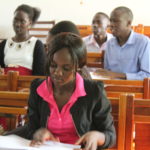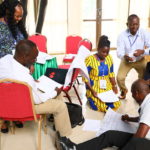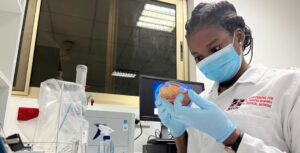
Strengthening critical thinking skills through different online learning approaches
With a wealth of conflicting ideas and opinions available online about many of the pressing issues facing the world today, skills to appraise information sources and recognise biases in interpreting evidence are so important. Siân Harris discusses two online approaches that INASP has been offering this year to help researchers develop their critical thinking skills.
Around the world, the COVID-19 pandemic has sparked many conflicting theories and pieces of advice on social media and elsewhere. It has also shown how quickly advice changes as new evidence comes to light. Faced with a wealth of ideas from different sources, it can be hard to know what to trust or how to respond.
This is not new to COVID-19. Climate change, vaccinations, what people should eat, political decisions and many other things spark an array of different and often contradictory perspectives. For the general public, students and researchers in these areas it is vital to know how to evaluate the credibility of different sources and to recognise the biases that we bring with us when we approach any new information.
This was the thinking that led INASP to develop an online course in critical thinking in 2017. It was initially developed for higher-education students – and an adaption of it is a core component of our work within the Assuring Quality Higher Education in Sierra Leone (AQHEd-SL) project. However, discussions with African university partners revealed a strong interest in a version of the course aimed at researchers. And, with much of the world in lockdown with potentially extra time for taking online classes and a pressing need to understand the current situation, the need for this course became even greater.
We decided to launch two adaptions of our online critical thinking course in the first half of this year – a self-paced tutorial and a light-touch facilitated course. The tutorial, which has been available and free to participants since May, is undertaken entirely at people’s own pace with no external support. Participants receive a certificate on completion to evidence their achievement. In June and July we ran our lightly facilitated course. In this lightly facilitated version we post reminders of weekly activities and answer technical questions. Participants are encouraged to share their reflections and questions in the discussion forums, as a criterion for receiving a course completion certificate – but INASP does not play an active role in forum discussion, beyond checking for and removing offensive or spam posts.
The participant feedback, along with our observations about the overall response to the training and the two approaches to delivering it, are now feeding into our development of future courses and tutorials. Below are some key highlights from a new paper by my colleague Veronika Schaeffler, who leads on our online critical thinking training:
- Both the self-paced tutorial as well as the light-touch facilitated course were well accepted by a diversity of participants from the Global South. Participants broadly found the level of difficulty to be appropriate.
“This has been a very useful tutorial and eye opening. I have always assumed that I was a critical reader, but realised that there is much more that I did not know. I tend to be good at probing and questioning when dealing with verbal information, but not so good at that when I am dealing with written information. I am now more alert about this weakness.” (Tutorial participant)
- More people took the online course than have taken the tutorial so far – from the launch in May until 23 September 2020, we awarded 166 completion certificates to participants who completed the self-study tutorial, while 295 participants completed the four-week facilitated course in June/July. The majority of participants in both were researchers.
- Participants said they were very satisfied with what they learnt – but we saw greater satisfaction with the light-touch facilitated course. In the feedback survey, 85% of the tutorial respondents and 93% of the facilitated course respondents say that they feel more confident about their critical thinking skills now.
“I am very grateful for the course, as I sought to get the knowledge on critical thinking for some time but just didn’t get it then. Keep up imparting more with the most needed insight. I am sure happy to come back again and tell more others about your course as I am very satisfied.” (Facilitated course participant)
- While 14% of the tutorial feedback survey respondents said they found it challenging that there was no facilitator support, only 3% of the facilitated course respondents ticked that the facilitator support was not enough.
- Even with light-touch facilitation (where there was a discussion forum but INASP did not participate in discussions) the discussion forum was lively and active, with some participants taking on informal roles in helping conversations to flow. Popular discussions were, for example: ‘How does culture affect critical thinking?’ (63 posts in the thread); ‘When not to critical think’ (23 posts); ‘Age of critical thinking (How early do you all think we can start helping children to develop the skill of critical thinking)’ (23 posts); ‘Qualities of an ideal critical thinker, do they change with changing roles?’ (22 posts); ‘Is critical thinking the same as creative thinking? If not, what is the difference?’ (20 posts); and ‘Scientific research and critical thinking’ (19 posts).
- Despite greater satisfaction with the lightly facilitated source, some participants particularly appreciated the flexibility of the self-paced tutorial to enable them to do it completely at their own pace.
“Please keep the timing open as it is. It really helped me to study at my pace else I would have missed the course.” (Tutorial participant)
- The COVID-19 situation motivates some people to join and complete online training, by, for example, freeing up time previously used for travel. However, some participants also faced challenges and barriers of learning, especially, for example, as a result of childcare commitments and higher costs or lower reliability of internet connections at home compared with in their institutions.
“For now I am working from home and the children (both toddlers) are with me. My attention is now divided and I had to really make out time to participate.” (Facilitated course participant)
“Well, in this phase of lockdown being inside home and making your brain work is really essential and I don’t know…. I might not have free time to complete the task prior to covid emergency.” (Facilitated course participant)
We discuss these findings in more detail in a new paper: Strengthening critical thinking skills through online learning.
The critical thinking self-paced tutorial remains open for anyone to join. We are also considering the possibilities for running another facilitated course. Building on some of the very positive feedback about the potential value of this course, we would be keen to raise awareness with lecturers and with others who might be interested in working with us. We have a demo module of the course that anyone can look at and explore how this might be adapted and tailored for their contexts. Please get in touch if you would like to explore possible options.
“This was perfect as an introduction to critical thinking and I am very grateful that you offered it as a free resource; With so much poverty and increased unemployment in South Africa at this time, it has been wonderful to have such a valuable resource available to offer students (I teach PostGrad business students). I intend prescribing the tutorial (and the one on searching) for all my students as compulsory preparation and will integrate testing of these skills into the content material that I teach (research methodology).” (Tutorial participant)
Cover image: agsandrew, via Shutterstock

 Previous Post
Previous Post Next Post
Next Post



As a former participant of the course, l indeed valued the content and learning out comes of the course. It was a very insightful course and really did open up my thinking space and capacity. I would highly recommend this course for youths in Sub-Saharan Africa as it would help with some of the educational challenges they face as they move through undergraduate and post graduate studies.
This is wonderful. It was unfortunate that my participation was not possible. I have gone through all that was done and it is encouraging and would want improvement. Keep it up and more grease to your elbow the organisers.